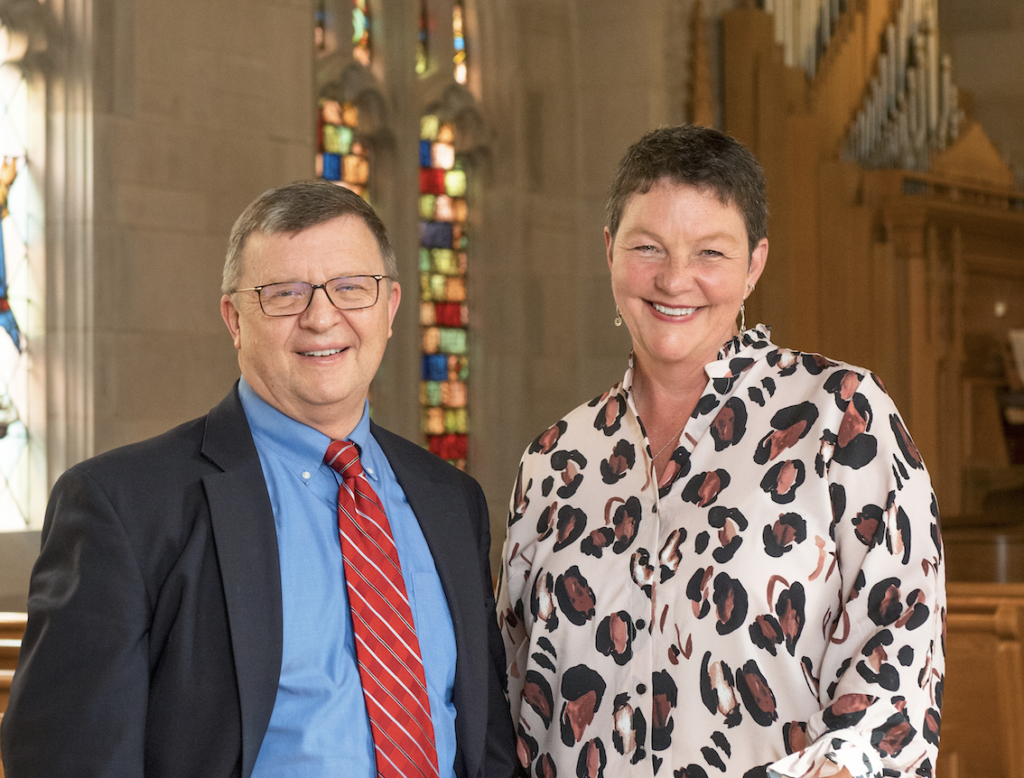
Chris Gambill and Beth Kennett
By Melanie Raskin
Sylvia Oberle and her ministerial search committee were in a unique and difficult position. They were trying to recruit a minister of faith formation and education for Knollwood Baptist Church and its approximately 800 active resident members … during the pandemic. Despite the challenges, the Winston-Salem church succeeded in finding a perfect fit, thanks to the Center for Congregational Health® (CCH), a one-of-a-kind-in-the-nation ministry of Atrium Wake Forest Baptist’s FaithHealth Division.
Since 1992, CCH has answered the evolving needs of faith communities with affordable, expert, research-driven consulting, coaching, interim ministry support, and continuing education and training for congregations, leaders and clergy.
“We could not have done it without CCH,” Oberle says. “Church decision-making is full of varied opinions that can be hard to navigate. The center gave us the freedom to be confident in our decisions and to trust the direction we were going.”
CCH is different from other consultants. It promotes health in faith communities by helping them call forth their innate creativity, resourcefulness and wholeness. The goal? To remind congregations that, using their own wisdom and understanding, guided by Spirit, they can do all things – including thrive. Because when churches thrive, communities thrive.
Churches are changing – now, more than ever. The COVID-19 pandemic brought virtual services front and center. It also brought freedom: People were able to choose how to spend their Sundays, their time, their money and their energy. Faith communities had to take a long, hard look at themselves, their missions, their structure and their buildings. And as they had since 1992, many found it was more productive with outside help, including Knollwood Baptist.
CCH director. “We don’t presume to come in and tell organizations how to do church. Instead, based on our broad experience, research, tools and connections, we help congregations create the space for conversation with each other in the presence of Spirit so the community can make good choices.”
That’s exactly what Knollwood did, with stellar and liberating results.
“We learned there is no one way to staff a particular church,” Oberle says. “It was exciting to see the ways roles could be reconfigured, which is what we chose to do. We were free to see things differently, to think differently – not from the past and ‘the way we used to do it’ – but from where we are now. We also discovered the bigger perspective. We were connected to churches and staff like ours across the country who gave us valuable feedback. Last and very important, it was a positive, encouraging, upbeat and fun experience, which really brought our team together.”
Adaptability for sustainability
For 30 years, CCH has consulted hundreds of faith communities, ranging from 15 to 5,000 people, in 30 Christian and some Jewish denominations in nearly every state in the US, as well as other countries. Despite the years and the changes he’s seen, Gambill feels the center’s value proposition remains the same: adaptability leads to sustainability. Case in point: During the pandemic, the center reimagined some of its own services into virtual offerings.
“If we get locked into only one way of operating, we’re unable to adapt to the changing situation around us. We can’t expect the world to adapt to us,” Gambill concluded. “The center has a broad and deep toolkit and decades of expertise to help congregations and leaders thrive. But we don’t just help transform churches, we transform communities so that love, compassion, justice and equity can grow.”
